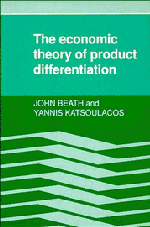Book contents
- Frontmatter
- Contents
- Preface
- 1 Introduction
- 2 Spatial models of imperfect competition
- 3 Symmetric preferences, the Chamberlinian paradigm
- 4 Product diversity and product selection: market equilibria and social optima
- 5 Product quality and market structure
- 6 Vertical product differentiation
- 7 Product differentiation and market imperfection: limit theorems
- 8 Product differentiation and the entry process
- 9 The gains from trade under product differentiation
- Notes
- Bibliography
- Indexes
7 - Product differentiation and market imperfection: limit theorems
Published online by Cambridge University Press: 03 May 2010
- Frontmatter
- Contents
- Preface
- 1 Introduction
- 2 Spatial models of imperfect competition
- 3 Symmetric preferences, the Chamberlinian paradigm
- 4 Product diversity and product selection: market equilibria and social optima
- 5 Product quality and market structure
- 6 Vertical product differentiation
- 7 Product differentiation and market imperfection: limit theorems
- 8 Product differentiation and the entry process
- 9 The gains from trade under product differentiation
- Notes
- Bibliography
- Indexes
Summary
Introduction
Up to this point we have taken for granted the persistence of imperfectly competitive market equilibria. The question that we now need to pay some attention to is just how fundamental such market equilibria are. Another way of posing the question is to ask whether, in the absence of contrived barriers to entry, one might expect, in an appropriate limiting sense, such equilibria to converge to the perfectly competitive equilibrium. If the latter were to be the case we could not then consider equilibria such as Chamberlin's large-group equilibrium as fundamental. This area of limiting results is one which has been actively researched by theorists in recent years and it is the work that we want to consider now.
There have been two broad approaches to the analysis of this topic. One of these, the ‘credible threats’ approach, has tackled the question by trying to make barriers to entry endogenous. They then become choice variables for incumbents in a multi-stage entry game and one then looks for a perfect equilibrium in this game in which potential entrants rationally choose not to enter. This is a question to which we turn in the next chapter and it is one that pre-supposes that entry is not ultra-free. However if it is difficult to deter entry then one would expect to find market equilibria in which the number of firms in the industry reached the maximum that was consistent with economic feasibility given the relationship between technology and market size.
- Type
- Chapter
- Information
- The Economic Theory of Product Differentiation , pp. 135 - 159Publisher: Cambridge University PressPrint publication year: 1991
- 1
- Cited by



